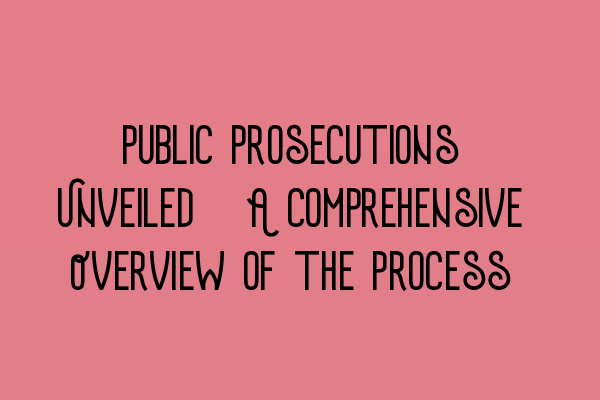Public Prosecutions Unveiled: A Comprehensive Overview of the Process
Welcome to the SQE Criminal Law & Practice Law UK blog! In this article, we will provide you with a comprehensive overview of the public prosecutions process. Whether you are a student preparing for the SQE exams or an aspiring solicitor, understanding how public prosecutions work is imperative.
The Public Prosecutions Process: From Start to Finish
Public prosecutions involve the state prosecuting individuals or entities for alleged criminal offenses. The process typically begins with the identification of a crime and the gathering of evidence by law enforcement agencies. Once the evidence is obtained, it is handed over to the prosecuting body, such as the Crown Prosecution Service in England and Wales. They review the case and make the decision to proceed with the prosecution.
Before a trial, the accused is informed of the charges against them and given the opportunity to enter a plea. If the accused pleads not guilty, the case proceeds to trial. If a guilty plea is entered, the case may proceed to sentencing, where the appropriate penalty is determined.
The trial is conducted in a court of law, where the prosecution presents its evidence and arguments. The defense has the opportunity to challenge the evidence and present its own arguments. The judge or jury then reaches a verdict based on the evidence presented.
Following a conviction, sentencing takes place. The court determines the appropriate penalty based on the circumstances of the case and any relevant legal guidelines. Appeals can be made against both the conviction and the sentence, which can lead to a re-evaluation of the case.
Importance of Effective Public Prosecutions
Effective public prosecutions are crucial for maintaining law and order in society. They ensure that individuals who commit criminal offenses are held accountable for their actions. Public prosecutions also serve as a deterrent to potential offenders, promoting a safer society as a whole.
Furthermore, public prosecutions play a significant role in upholding the rule of law and protecting the rights and interests of victims. By prosecuting individuals who harm others, the justice system provides a sense of closure, justice, and satisfaction to those affected by criminal acts.
Role of Solicitors in Public Prosecutions
Solicitors play a vital role in public prosecutions. They are responsible for advising the prosecuting body on legal matters, reviewing evidence, interviewing witnesses, and preparing the case for court. Solicitors also represent the prosecution during the trial, presenting evidence and arguments to support the charges against the accused.
It is essential for solicitors to possess in-depth knowledge of criminal law, evidence gathering, and court procedures to effectively navigate the complexities of public prosecutions. The SQE 1 Preparation Courses offered by SQE Criminal Law & Practice Law UK provide aspiring solicitors with the necessary skills and knowledge to excel in this field.
Preparing for SQE Exams
If you are a student preparing for the SQE exams, it is crucial to practice and familiarize yourself with the exam format and question types. The SQE 1 Practice Exam Questions and SQE 1 Practice Mocks FLK1 FLK2 provided by SQE Criminal Law & Practice Law UK are excellent resources to test your knowledge and identify areas for improvement.
Additionally, the SQE 2 Preparation Courses offered by SQE Criminal Law & Practice Law UK can help you strengthen your understanding of the practical skills required to excel in public prosecutions and other areas of legal practice.
To stay updated with the latest information on SQE exams, be sure to check the SRA SQE Exam Dates page regularly.
